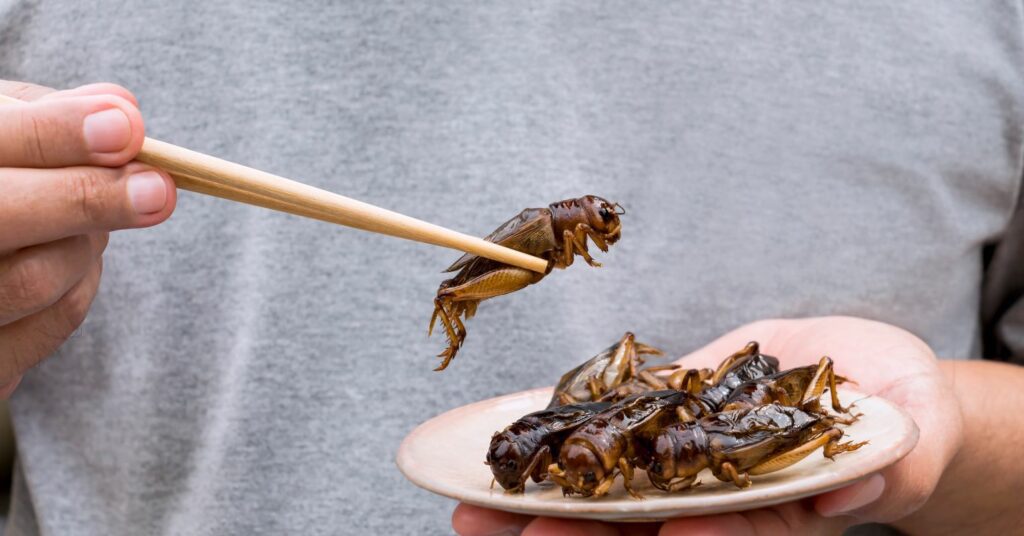From a young age, I’ve been living in a world of meat. I grew up in a household where my dad, a skilled butcher, and my mom ensured that meat played a prominent role in every meal. When I left my hometown to study psychology, I moved to a city where many people are vegetarians, and I have gotten used to seeing menus with limited meat options.
article continues after advertisement
However, nothing could have prepared me for a recent suggestion from a friend who had the idea to add crickets or “perhaps some other insect” to her curry for extra nutrition. I was shocked and a little repulsed. The idea of willingly consuming creatures that once crawled or jumped seemed beyond comprehension to me.
The benefits of eating insects
Curious to learn more, I turned to Google to see what eating insects was all about, as I could not imagine that it would be tasty, healthy, or appealing in any other way. To my surprise, I discovered that the concept of consuming insects has gained popularity in recent years. Traditionally, meat and fish have been primary sources of protein, but their environmental impact is concerning. It’s crucial that we explore more sustainable alternatives, and insects present several advantages. They produce lower greenhouse gas emissions, require less water, and pose a lower risk of disease transmission compared to traditional meats.
Despite these benefits, many people in Western countries (including myself) remain unconvinced. Negative perceptions about the taste of insects, cultural taboos, and feelings of disgust all play a role. However, as I read more about it, my curiosity grew, and I noticed that I became less disgusted by the idea of having a tasty collection of grasshoppers in my curry.
article continues after advertisement
Are you curious about eating insects?
In fact, a recent study by Stone, FitzGibbon, Millan, and Murayama (2022) investigated whether curiosity predicts our willingness to try insect-based food. The authors designed two experiments where participants completed an online menu evaluation task. Participants were shown images of dishes resembling those on a restaurant’s “special board,” accompanied by descriptions. In Experiment 1, half of the images contained insects, while the other half featured visually matched familiar foods. In Experiment 2, the images for insects and familiar foods were the same, but the descriptions varied. Participants rated each dish on factors such as curiosity, familiarity, and tastiness and indicated their willingness to try each dish.
What do you think? Will curiosity predict how willing you are to try a certain dish, even if it contains ants, grasshoppers, crickets, or mealworms? The authors found in both experiments that curiosity was one of the strongest predictors of our willingness to try both insect and non-insect foods. In other words, the more curious you are about a dish, the more willing you are to try it, regardless of whether it contains insects.
However, the authors also discovered a curiosity-boosting effect, where curiosity interacted with other factors to enhance their impact on willingness to try. This effect was observed for dishes containing insects but not for non-insect foods. For example, participants’ ratings of tastiness predicted their willingness to try a dish containing mealworms. If a person was also curious about the dish, the effect of tastiness on willingness to try was even stronger. So, if someone rates a dish with mealworms as particularly tasty, they will be even more willing to try it if they are also curious about the dish. This is because their curiosity amplifies the impact of tastiness on their decision to try it.
article continues after advertisement
Let’s crawl towards a better future
These studies confirm curiosity as a key predictor of willingness to try insect foods. The findings highlight the unique role of curiosity beyond other relevant factors and reveal how it interacts with other predictors to increase the willingness to try novel foods, such as insect-based dishes. Given the significant environmental benefits of consuming insects—such as lower greenhouse gas emissions, reduced water usage, and a lower risk of disease transmission—this increased willingness, driven by curiosity, could play a crucial role in promoting sustainable eating habits and addressing global environmental challenges.
Reflecting on my friend’s suggestion to add crickets to her curry, it’s clear that her curiosity played a significant role in her openness to trying insect-based dishes. I wonder if the same could be true for my dad, the dedicated butcher. Could his curiosity about new culinary experiences lead him to appreciate a dish with crickets, mealworms, or ants as much as he does his beloved meat? Only an adjustment in my parents’ cooking habits and a bit of curiosity will tell.
References
Stone, H., FitzGibbon, L., Millan, E., & Murayama, K. (2022). Curious to eat insects? Curiosity as a key predictor of willingness to try novel food. Appetite, 168, 105790. https://doi.org/10.1016/j.appet.2021.105790
Source link : https://www.psychologytoday.com/za/blog/why-so-curious/202407/how-curiosity-can-lead-to-sustainable-food-choices?amp
Author :
Publish date : 2024-07-10 16:31:47
Copyright for syndicated content belongs to the linked Source.
